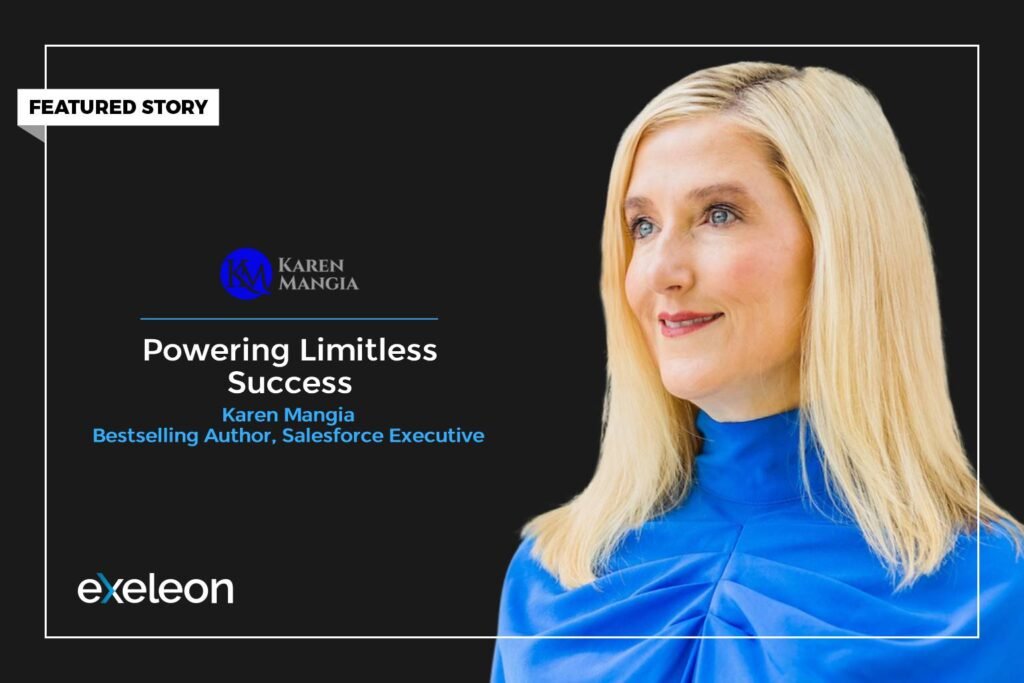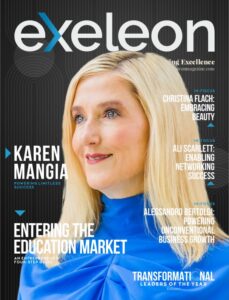Success means many things to many people. More often than not, success is equated with ‘more’. People buy into the belief that there is a pressing need to do more, have more and be more to accelerate their life. This can then seep into the hunt for more money, more recognition, and more opportunities.
But one transformational leader is on a mission to decode and inspire what it means to be more. In her WSJ Bestseller – Success from Anywhere, Karen Mangia leans into the power of abundance and redefines what success means to you.
Karen Mangia is also an international keynote speaker, author, and business personality whose mindset embodies the three dynamic A’s – Accept, Adapt and Accelerate. This mindset has laid the foundation of countless training, keynotes, and conversations that has helped her to lead through change.
She believes that when it comes to transformation, “these three concepts create a powerful playbook of new possibilities.” Moreover, she also resonates with a quote from Michael J. Fox, actor and advocate, “Acceptance doesn’t mean resignation; it means understanding that something is what it is, and there’s got to be a way through it.”
Perhaps, accepting what it is opens new doorways to success and leads to what you could be. “Without acceptance, you’re solving imaginary problems while denying the real ones,” she remarks.
A beautiful symphony of music and food
Karen’s childhood is best summarized as Midwest, Mangia, and Music. She grew up in three different cities in the Midwest and her bustling childhood reads like a cookbook, seasoned with nostalgia, passed down from generation to generation. “I treasure the handwritten, food splattered recipes I inherited from both of my grandmothers,” she fondly recalls.
Going down the memory lane, Karen’s happiest childhood snippet was walking through the backdoor into her grandparents’ kitchen and smelling sauce simmering on the stove. “That smell is more than spaghetti sauce. That smell is love. That smell is happiness and belonging,” she remarks.
Additionally, music had an imposing role to play in her early years. She had a rare talent as she taught herself to play the piano by ear as a child. “Santa gifted me a toy piano with 25 keys. There was a color strip that rested between the keys and the music stand. The songbook was color coded to correlate. After I learned the songbook by heart, I started playing by ear,” she said. She recollects hearing a tune on TV or on the radio and then diligently decoding it using her out of tune toy. In the same manner, Karen has always been able to play the soundtrack for her life.
Karen was an enthusiastic soul and her yearly summer visits to her grandparents’ house is a testament to that. She would spend the entire week writing plays for her cousins. “I was the playwright, casting director, rehearsal director, backstage coordinator, costume designer, set designer and occasional actress,” she reminisces. Although they didn’t win a lot of Academy Awards, they did garner a lot of applause and built ever-lasting memories.
And finally, her earliest leadership memory is playing office. Since her brother is four years younger than her, she donned the role of an employer while her brother played the part of employee. “He’s held distinguished titles in my imaginary school systems, offices and banks. If you ask him now, he’ll tell you performance reviews were rough,” she jokingly remarks.
Creating world-class experiences
Over the years, Karen Mangia has become a pioneer when it comes to customer success and experiences. But it has taken several years to garner and build this expertise.
The beginning of this journey was when her college professor, Bob Papper, inspired her love of qualitative research, quantitative research, and storytelling. “I was a student in his Telecommunications news classes and worked for him as a research assistant. My job was to administer the annual survey he sent to members of the Radio & Television News Directors’ Association (RTNNDA),” she mentions.
Her daily tasks would be to call non-respondents and administer surveys over the phone. She would then correlate responses, analyze trends and search for the storyline. Later, Karen also got a chance to co-author an article with her professor about trends in television internships where the focus was both on the employer and employee experience.
After achieving this milestone, Karen’s post-graduate goal was to work for Nielsen Ratings doing experience research only to later discover that they were headquartered in Iowa. But that didn’t discourage her will as she decided to take up sales and sales leadership for Fortune 100 tech companies instead.
Karen feels, “Frontline action is fertile ground to discover what customer experience and customer success are really like and the glaring gap between companies’ stated experiences vs. customers’ lived experiences.”
After some time through a series of happy accidents, she landed a dynamic role in leading the global Customer Experience portfolio for Cisco. About a year into that role, she had an epiphany. She recalls, “I was living my dream deferred. Essentially, I was running the Nielsen Ratings portfolio for Cisco.”
Hereafter, there was no stopping this success train. Karen’s Customer Experience blog created an opportunity for her to join the Market Strategy team at Salesforce.
In due course, the Market Strategy role at Salesforce created more writing opportunities, including an entire book dedicated to Customer Experience and Customer Success: Listen UP!: How to Tune in to Customers and Turn Down the Noise.
Building her power of resilience
Karen’s approach to provide optimal client satisfaction is simple yet significant. Her philosophy hinges on the fact that everyone wants to feel seen and heard.
According to her, the three most powerful words in leadership are, “I hear you.” She says, “I used to think being a great leader meant being the one with all the answers. Now I understand that leadership is listening. And that listening begins with asking better questions. Because every great discovery begins with a great question.”
Karen believes that it is important to engage in a dialogue that lets your customers feel heard, listened to, and understood. A good leadership team takes ego out of the conversation so that the customer can hear what needs to be said.
Listening without defensiveness leads to a deeper understanding of what it really takes to do what your competition won’t or can’t. Ultimately, she concludes, “listening is the most important connection in any organization: the connection to the customer.”
While building a strong client experience is absolutely pivotal, Karen ensures that her professional and personal lives are well-balanced. For her, routines, rituals, and boundaries set the tone of her entire day.
“Establishing a schedule is the first step in setting the routines and rituals that matter. I get up at the same time every day and start my day the same way – with music, mindfulness, movement and gratitude,” she says.
In order to complete her most critical deliverables, her first work task is always deep work – whatever she needs to create that adds value; whether that’s a book chapter, a blog, or another creative task.
Additionally, she also sets a finish time each day and signals that finish time to herself with an alarm clock. “After the closing bell rings, I power down all of my devices. Then I listen to one song for five minutes to transition into my evening,” she remarks.
One of her most striking realizations has been – if everything is important, then nothing is important. These three questions – and a bonus question – help her distill what’s most important in any given moment:
- Does it have to be?
- Does it have to be me?
- Does it have to be right now?
- Bonus: Does it have to be a meeting?
Fearlessly battling challenges
From starting out as an account manager to becoming a globally recognized leader with multiple awards to her name, Karen’s journey has been nothing short of a blockbuster movie.
In her own words, “The journey has been an unpredictable adventure. From setbacks to comebacks. From despair to discoveries. From breakdowns to breakthroughs. I am grateful for the people who have supported me through my personal and professional crossroads.”
Karen feels that one should befriend discovery and explore each nook and cranny of your life. “If I had known where I was going all along – or been attached to a single outcome – I would have missed the joy of discovering new people, new places and new perspectives,” she adds.
And when quizzed about the one thing that she would do differently if she could go back in time, she answers in a heartbeat: I’m not one for regrets.
She believes we’re all doing the best we can with what we have and what we know and where we are in our journey at any given moment. But, if she could whisper one critically important message in the ear of my younger self, it would be “Fewer obligations, more joy.”
Powerfully leaning into “more”
Through Karen’s WSJ Bestseller – Success from anywhere, she shows how to move into the abundance that you deserve. She also delves into the meaning of success and guides you to assess your past patterns to create better and sustainable results.
While sharing about her book, she emphasizes on The Great Resignation. With employees sending a clear and urgent signal that more pay or more perks isn’t summing up success for them, Karen’s mind got ticking with a different question. “More… of what truly matters?”
Her book is an invitation to freedom. The freedom to choose the work model that makes the most sense. The freedom to choose your own values. And the pathway to bring your values to life, as you make new discoveries around the true nature of success.
There is also a series of game changer activities throughout the book and the bonus playbook guides readers through reconnecting with and making room for what matters most.
Her profound advice
Karen Mangia has a world of wisdom to offer, especially for aspiring and emerging business leaders. Her carefully curated advice would be to create a beautiful future based on your set of values.
She further elaborates, “The future of work is less about how we reconfigure cubicles and more about how we redesign our relationship with work.” The beginning of redesign, in part, starts with an examination of your values. And extends into the values of your organization.
Success happens one individual – one person – at a time. And when there is a change in our relationship with work, everything changes. She adds, “It’s time to change the game. Because organizations win when people win. When the players see a new game is possible, new results follow.”
Karen’s radiant experience is truly captivating. She emphasizes on the thought – The future belongs to those who create it and is thrilled to discover what the future holds for her.
She is confident that her future journey is brimming with infinite possibilities.
[mailerlite_form form_id=4]











